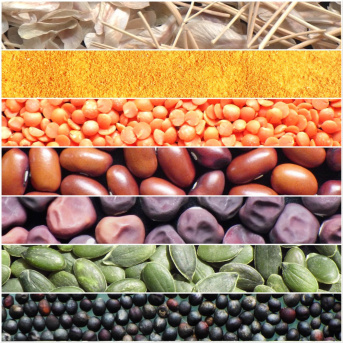The BSB department focuses on plant biomolecules (structure, diversity, biosynthetic pathways and their regulation) with a dual objective: (1) to understand their role in plant and seed physiology and development, and (2) to optimize their production, properties and agro-industrial use.
Biological Questions
The BSB department researches on:
> The diversity and structure of plant molecules (proteins, lipids, lignins, polysaccharides, primary and specialized metabolites, hormones).
> The biosynthetic pathways, metabolic engineering and functionalization of these biomolecules.
> The developmental and environmental regulation of these biosynthetic pathways.
> The biological functions of these biomolecules in relation to the physiology and development of the plant or seed that produces them.
> Methods for extracting these molecules and deconstructing plant material.
Models, tools and methods
To carry out this research, the BSB department uses:
> A variety of model and cultivated plants: oilseeds, proteinaceous species, legumes, market garden species, woody plants and cereals.

> Natural genetic diversity (collection of accessions) or induced (random mutagenesis or targeted edition)
> Various production chassis: bacteria, yeasts, mosses, tobacco, insect cells, transgenic plants (leaves, seeds).
The department relies on a wide range of methods and multiscale approaches combining different scientific disciplines.
> Analytical chemistry
> Biochemistry and structural biochemistry
> Molecular and synthetic biology
> Cell biology and cytology
> Genetics and genomics
> Physiology
> Multi-omics approaches
> Bioinformatics, modeling, and statistics
> Artificial intelligence
Societal and economic impacts
The research of the BSB department aims to meet society's demand for food and to provide renewable resources for industry. The results of our research should support strategies to improve plants, make the best use of plant biomass, and develop bio-solutions in the dual context of adapting to climate change and modifying agricultural practices to control their environmental impact.
The BSB department researches on:
> The diversity and structure of plant molecules (proteins, lipids, lignins, polysaccharides, primary and specialized metabolites, hormones).
> The biosynthetic pathways, metabolic engineering and functionalization of these biomolecules.
> The developmental and environmental regulation of these biosynthetic pathways.
> The biological functions of these biomolecules in relation to the physiology and development of the plant or seed that produces them.
> Methods for extracting these molecules and deconstructing plant material.
Models, tools and methods
To carry out this research, the BSB department uses:
> A variety of model and cultivated plants: oilseeds, proteinaceous species, legumes, market garden species, woody plants and cereals.

> Natural genetic diversity (collection of accessions) or induced (random mutagenesis or targeted edition)
> Various production chassis: bacteria, yeasts, mosses, tobacco, insect cells, transgenic plants (leaves, seeds).
The department relies on a wide range of methods and multiscale approaches combining different scientific disciplines.
> Analytical chemistry
> Biochemistry and structural biochemistry
> Molecular and synthetic biology
> Cell biology and cytology
> Genetics and genomics
> Physiology
> Multi-omics approaches
> Bioinformatics, modeling, and statistics
> Artificial intelligence
Societal and economic impacts
The research of the BSB department aims to meet society's demand for food and to provide renewable resources for industry. The results of our research should support strategies to improve plants, make the best use of plant biomass, and develop bio-solutions in the dual context of adapting to climate change and modifying agricultural practices to control their environmental impact.

Department head:
Anne-Marie Le Coq
Sébastien Baud
Anne-Marie Le Coq
Sébastien Baud